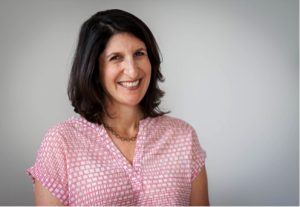On Escaping Biglaw: An Interview With Career Coach Elena Deutsch
You can find out additional information about Elena Deutsch over on her website, Women Interested in Leaving Law.

Elena Deutsch
In my last post, I talked about the importance of seeking help from a therapist when faced with a mental-health struggle. Therapists can help to identify illnesses and methodologies for treatment. They can help you explore the why behind your behaviors.
Coaches are different in that they help to clarify and achieve your goals. This can be in your career, in your business, or your personal life. Career coaches can help you explore the how. How do you get from here to there?

Early Adopters Of Legal AI Gaining Competitive Edge In Marketplace
For this post, I sat down with career coach, Elena Deutsch. Elena specifically works with Biglaw lawyers who are experiencing dissatisfaction and helps them find more fulfilling careers.
JC: Tell me briefly about you.
ED: I offer senior and mid-level female associates a career transformation program to begin their path out of Biglaw, even if they’re scared and not sure what to do next. I do this through a program called, “WILL,” which stands for Women Interested in Leaving (Big) Law.
I’ve done years of leadership coaching with lawyers and executives across industries. I see a lot of pain and inertia in big firms. I offer WILL for women who want to leave a system that is not working for them or their lives.>
JC: What does a coach do? Why should lawyers considering leaving Biglaw work with a coach?
Sponsored

Legal AI: 3 Steps Law Firms Should Take Now

Early Adopters Of Legal AI Gaining Competitive Edge In Marketplace

Navigating Financial Success by Avoiding Common Pitfalls and Maximizing Firm Performance

The Business Case For AI At Your Law Firm

ED: Coaches create dedicated time for clients to pause, reflect, and take action in pursuit of goals. Then, clients can be more intentional about how they spend their time and energy.
Coaches can help lawyers considering leaving Biglaw in a couple of ways.
First, by bringing attention to mindset. Coaching can uncover where we get stuck and help develop inner skills to be more conscious of how our thoughts influence our actions.
Second, coaches help clients clarify and set goals. If a lawyer wants to leave Biglaw, a coach can help them name their strengths, values, and what they want from their career and life. Then coaches provide support and accountability as client takes action towards their desired results.
JC: What are some common reasons why Biglaw attorneys choose to leave?
ED: Many attorneys I’ve spoken and worked with have no say over their schedules. Their lives lack any predictability or control.
It is extremely difficult to plan their evenings, or truly take a vacation or weekend off.
Many said Biglaw does not work for women. And this is not only said by women who have children. It is about the structure and culture of firms. Firm leaders are typically older men, who have been able to devote their life to the firm. That’s at odds for how many millennials and others operate.
Some firms are working to change this and are more on the cutting edge than others.
People I’ve spoken with want more agency, to plan a day off, shop and cook, or have friends over. If they have a partner and or kids, they want to spend time with them. If they are single, they want to date.
JC: What are some of the obstacles and limiting mindsets that big law attorneys must work with before change is possible?
ED: I see a number of common obstacles. People are afraid of what others will think. Some worry about parents, partners, or friends. Others don’t want anyone to think they “can’t hack it.” Some wonder what’s wrong with them if they don’t want to make partner.
Often people feel indebted to a mentor who has invested in them. They don’t want to disappoint that person by leaving.
Some find it hard to share they want out of the firm. It’s an implicit rejection.
Practicing law in a big firm is the only work many associates have known. They worry that their skills are too narrow and it’s hard to explore what’s out there while so enmeshed in the firm.
Underneath all this, is fear of the unknown. Fear wants to hold onto what’s known and familiar. To remain part of the tribe. This fear breeds inertia.
I ask people also to consider the risk of not acting, and staying indefinitely.
A coach can help refocus that mindset, on strengths, interests and values, so you get excited about new possibilities. Loving what you do is a legitimate goal!
Sponsored

The Business Case For AI At Your Law Firm


Is The Future Of Law Distributed? Lessons From The Tech Adoption Curve
JC: Can you share some of the next chapter’s Biglaw clients you’ve worked with found after leaving?
ED: Sure! I stay in touch with many of my clients.
When I began with one client, he said, “I could die in my office and no one would find me for weeks”. He was from abroad but working in a New York white-shoe firm. Now he is back in his home country.
He negotiated a great exit for himself. By the way, because of their negotiation skills, many past clients successfully sought, and won, good exit packages. He took a year off to travel and co-produce a TV show. He realized what he missed about law and did temporary legal work.
He ended up reconnecting with a colleague and went back into firm life, but in an in-house role. Now he goes home and has dinner with his partner every night. They put their phones away and talk.
Another woman moved back South and is at a Fortune 500 company, doing government relations. I’ve had clients land at startups here in New York City.
Lawyers who want to dip their toe into this work can join the June 7th Shape the Law webinar. You will begin to describe your ideal day, and the skills, interests, and values you want present in your work.
You can find out additional information about Elena Deutsch over on her website, Women Interested in Leaving Law. She is also offering a 1-hour webinar on June 7th.
 Jeena Cho is the author of The Anxious Lawyer: An 8-Week Guide to a Joyful and Satisfying Law Practice Through Mindfulness and Meditation (affiliate link). She regularly speaks and offers training on mindfulness and meditation. You can reach her at hello@jeenacho.com or @jeena_cho on Twitter.
Jeena Cho is the author of The Anxious Lawyer: An 8-Week Guide to a Joyful and Satisfying Law Practice Through Mindfulness and Meditation (affiliate link). She regularly speaks and offers training on mindfulness and meditation. You can reach her at hello@jeenacho.com or @jeena_cho on Twitter.







